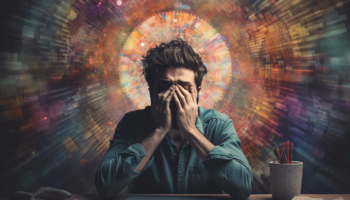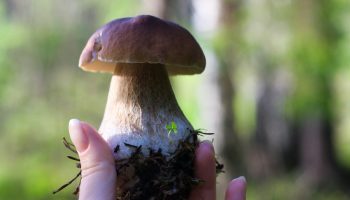
People have been using psychedelics to explore their consciousness for ages. Yet, these mind-manifesting substances have remained in the shadows, just beyond a legal psychedelic world.
Psychedelics are still illicit in most places. But, the resurgence of research proving their inherent value has led to a third wave of acceptance, where curious optimism has paved the way for progressive policies.
Approximately 30 countries have decriminalized drug use in some way. Portugal went so far as to decriminalize all drugs in 2001, shifting to a health-centered approach to harm and misuse.
In the U.S., 25 states considered 74 bills amending antiquated drug laws from 2019 to 2022 and about 10% were signed into law. In the last few years, Oregon and Colorado passed sweeping legislation legalizing therapeutic psilocybin use and decriminalizing specific plant-based psychedelics.
In Canada, British Columbia became the first province to decriminalize small amounts of certain drugs in 2023, prioritizing health over punishment. And Australia recently passed a major psychedelic therapy bill.
Decriminalization and medicalization bills do not make commercial drug sales legal. But these measures mean citizens can exercise freedom to consume psychedelics and plant medicines without facing harsh legal penalties.
The guide delves into the complexities surrounding legal psychedelics, substance legalization and safety. It highlights the challenges advocates face but also points to growing opportunities. This guide also offers a snapshot of legal and psychedelic-friendly regions worldwide.
Challenges and Opportunities
Advocates of psychedelic legalization encounter many challenges, ranging from deeply ingrained stigmas to historical misconceptions.
Psychedelics’ stigma as “dangerous substances” often hampers legislative efforts, impeding society’s ability to recognize their therapeutic potential. Additionally, navigating complex regulatory frameworks and overcoming concerns about public safety pose significant obstacles.
Despite the challenges, growing opportunities for legalization and decriminalization efforts exist globally. The increased scientific research highlighting psychedelics’ medicinal and therapeutic benefits has sparked interest among policymakers.
The potential impact of psychedelic substance legalization on mental health and well-being is a central consideration in most legalization efforts.
Advocates argue that legal access to psychedelic medicine could revolutionize mental health, offering effective options for people struggling with depression, PTSD, addiction, and anxiety.
Exploring mental health opportunities requires lawmakers to consider the evidence and public health implications of implementing such practices.
Safe Access to Psychedelics
Safe and controlled access to psychedelics and plant medicines is essential for any jurisdiction venturing into the realm of psychedelic experiences. Legal programs must highlight “set and setting” as the foundational principle to maximize healing outcomes.
“Set and setting” refers to the person’s mental state and physical environment in which a psychedelic journey takes place, critical in shaping the quality and safety of the experience.
Setting:
A serene and comfortable space, free from potential disturbances or negative energy, is crucial for fostering a positive atmosphere. A peaceful, controlled setting helps people feel secure, enabling them to let go of anxiety and fully immerse themselves in the experience.
Curating a tranquil psychedelic setting involves soothing lighting, comfortable furnishings, and elements that promote relaxation and introspection.
Set:
A person’s mood, emotional state, and psychological preparedness can profoundly shape the trajectory of a psychedelic experience.
Trained professionals often assist individuals in cultivating a positive mindset, helping them address any concerns or anxieties before the journey. Establishing a positive mindset enhances the likelihood of a constructive and transformative encounter.
Professional Support:
Accessing psychedelics in a safe and controlled environment often involves trained professionals guiding and supporting the process. Psychedelic practitioners may include therapists, facilitators, or guides trained in navigating the complexities of mind-altering experiences.
Their role is to provide a reassuring presence, offer support when needed, and guide explorers through the various stages of the journey. Professional expertise minimizes the risk of adverse reactions and maximizes the potential for positive outcomes.
Minimizing Risks and Amplifying Benefits
In a safe and controlled setting, adverse psychedelic effects, such as anxiety, confusion, or challenging emotions, can be effectively managed.
Trained professionals can handle unexpected situations, ensuring the well-being of individuals throughout the journey.
Within this supportive cocoon, a profound sense of trust and openness flourishes. This nurturing atmosphere liberates individuals to delve into their thoughts and emotions, offering a space where the fear of judgment dissipates, paving the way for authentic self-exploration.
Whether psychedelics are employed for therapeutic purposes or personal exploration, the safe access paradigm is underpinned by the pillars of intention, meticulous preparation, and the reassuring presence of knowledgeable professionals. These pillars collectively serve as a compass, guiding individuals on a journey of safety, insight, and transformative potential.
Psychedelics’ Legality Around The World:
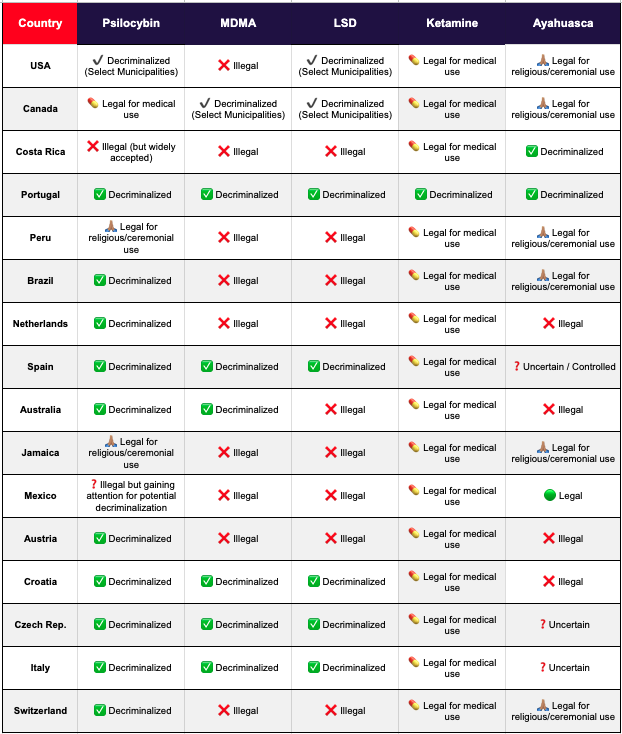
Where are Psychedelics Legal Across the Globe?
Below, we’ll break down the substances outlined in the above infographic and their current legal status.
Legal Psychedelics in the United States
The United States’ convoluted history with these substances has left many people confused about psychedelics’ legality. State and municipal rules further complicate the matter.
According to the Controlled Substances Act (CSA), the short answer is that most psychedelic substances are federally banned. Two states have passed targeted legalization and broad decriminalization bills. And several American municipalities have drafted their own progressive rules on possession and use.
Most bills focus on plant-based entheogens, like psilocybin and ayahuasca, rather than synthetic compounds like LSD (lysergic acid diethylamide) and MDMA.
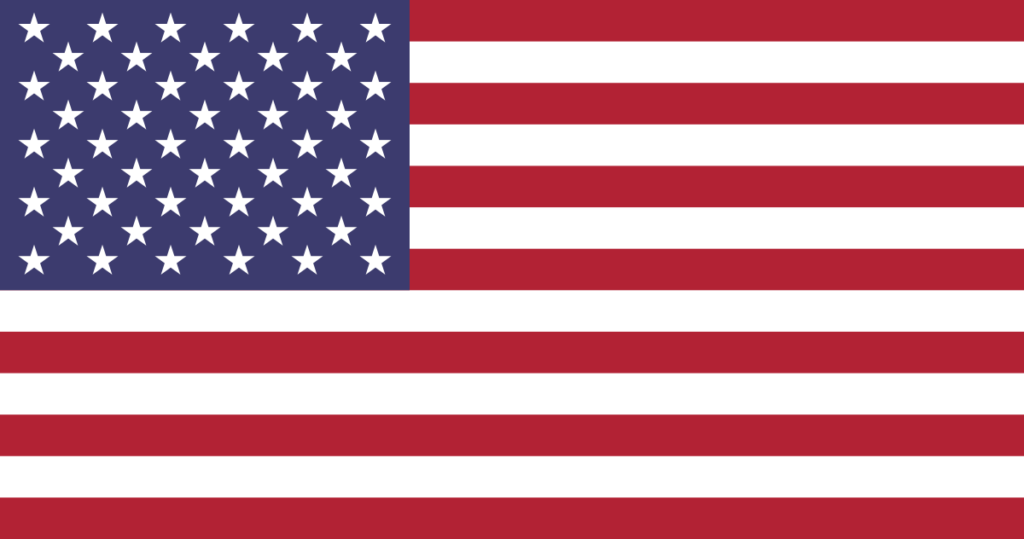
Where is Psilocybin Legal in the US?
Psilocybin’s legal status in the United States varies by state. Some states, like Oregon, have decriminalized or legalized the use of psilocybin for therapeutic purposes, while others maintain strict prohibition. Federal law classifies psilocybin as a Schedule I controlled substance, making it illegal nationally.
Oregon:
In 2020, Oregon made history by becoming the first state to legalize the use and sales of psilocybin for adults through the “Oregon Psilocybin Services Act.” In 2023, Oregon achieved another milestone with the opening of the country’s inaugural psilocybin therapy and healing centers, offering supervised psychedelic experiences.
Colorado:
In 2022, Colorado achieved a significant milestone by passing its second psychedelics ballot initiative. Proposition 122 decriminalized the personal use and possession of natural psychedelic plants and fungi while establishing regulatory guidelines. This legislation also lays the groundwork for state-sanctioned “healing centers,” akin to what Oregon (measure 109) has pioneered.
Decriminalized (Select Municipalities)
- California
- Colorado
- Oregon
- Massachusetts
- Michigan
- Washington
- Washington, DC.
Where is MDMA Legal in the US?
MDMA, commonly known as ecstasy, is illegal in the United States. It is classified as a Schedule I controlled substance, making its possession, sale, and use for recreational purposes unlawful. Oregon is the only state that decriminalized MDMA possession in small quantities, less than 1g or five pills.
Additionally, MAPS (Multidisciplinary Association for Psychedelic Studies) has dedicated substantial financial resources and effort to guide MDMA therapy through the rigorous FDA approval process.
In January 2023, MAPS announced favorable outcomes from its second Phase 3 clinical trial, known as MAPP2, focusing on MDMA-assisted therapy for PTSD. MAPS expects to receive FDA approval in 2023.
Where is LSD Legal in the US?
LSD is illegal in the United States and classified as a Schedule I controlled substance. Its possession, distribution, and use for recreational purposes are strictly prohibited.
Oregonians possessing less than 40 LSD units should not face legal penalties.
Where is Ketamine Legal in the US?
Ketamine is legal for medical and veterinary use in the United States. It is FDA-approved for anesthesia only. But ketamine clinics nationwide are also administering IV infusions, intranasal sprays, and subdermal injections off-label for chronic pain, PTSD, and depression.
Recreational use, however, is illegal. Ketamine is a Schedule III controlled substance.
Where is Ayahuasca Legal in the US?
Ayahuasca’s legal status in the United States is complex. Ayahuasca is generally illegal due to its DMT content. However, some religious groups have received exemptions for its ceremonial use under the Religious Freedom Restoration Act. Examples include Utah’s Hummingbird Church and Florida’s Soul Quest Ayahuasca Church of Mother Earth.
Legal Psychedelics in Canada
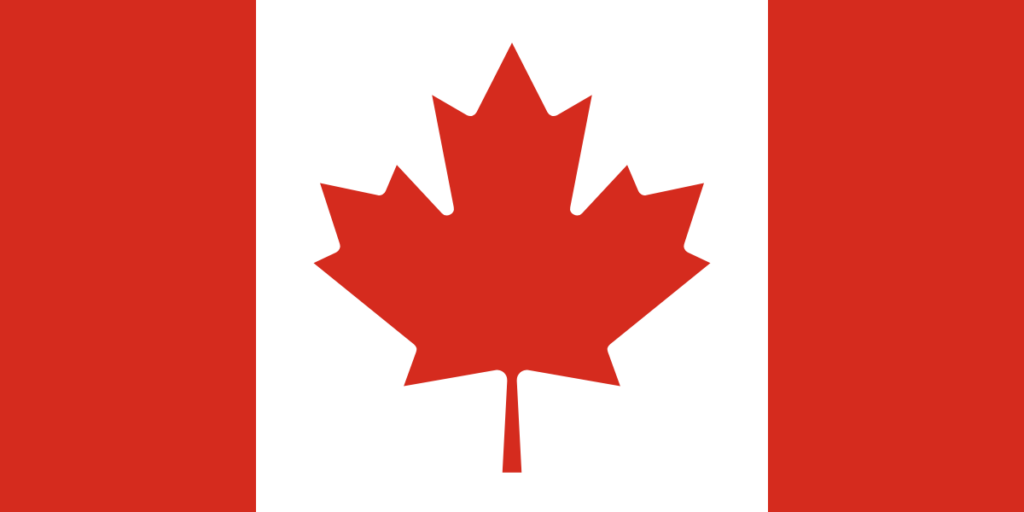
Is Psilocybin Legal in Canada?
The Canadian government has a unique Special Access Program (SAP), allowing patients with severe conditions to access restricted drugs. Unfortunately, the process is bureaucratic and slow.
At the same time, consumers in Toronto and Vancouver have no trouble accessing psilocybin. Several mushroom dispensaries operate in defiance of the law, advocating for humanity and mental health.
Is MDMA Legal in Canada?
MDMA is mostly illegal in Canada and is regulated by federal criminal law. Initially prohibited in 1968, MDMA falls under Schedule I of the Controlled Drugs and Substances Act.
Recent Health Canada amendments (January 2022) to the Special Access Program enable medical professionals to request MDMA for severe or life-threatening conditions when other treatments are insufficient or unavailable.
Additionally, British Columbia decriminalized personal possession (up to 2.5 grams) on January 31, 2023, through a federal s.56 exemption.
Is LSD Legal in Canada?
LSD is illegal in Canada, and its possession, distribution, and use for recreational purposes are prohibited under the Controlled Drugs and Substances Act.
Is Ketamine Legal in Canada?
Ketamine is legal for medical and veterinary use in Canada. Like the US, several ketamine clinics administer the medicine off-label for chronic pain and mood disorders as well. However, recreational use is illegal and subject to criminal penalties.
Is Ayahuasca Legal in Canada?
The legal status of Ayahuasca in Canada is complex. The DMT it contains is a controlled substance. But the brew itself has varying legal interpretations. Religious and spiritual groups have received exemptions for ceremonial use. But the government can change or challenge its legal status at any time.
Legal Psychedelics in Costa Rica

Is Psilocybin Legal in Costa Rica?
Psilocybin is not explicitly legal in Costa Rica. However, cultural norms accept the use of psilocybin in traditional and spiritual contexts. Countless psilocybin retreat centers operate in Costa Rica without legal trouble.
Is MDMA Legal in Costa Rica?
Costa Rica’s drug laws prohibit the personal use of narcotics like MDMA but do not penalize those who violate this prohibition. The possession of unauthorized drugs for personal use is punishable by administrative sanctions, such as suspending a driver’s license. Additionally, people consuming MDMA and other drugs in public may face fines.
Is LSD Legal in Costa Rica?
LSD is illegal in Costa Rica for possession, distribution, and recreational use are prohibited. However, personal use offenders likely won’t face criminal penalties.
Is Ketamine Legal in Costa Rica?
Ketamine is not explicitly regulated in Costa Rica, so its legal status is somewhat uncertain. Doctors administer the drug for therapeutic purposes, but recreational use could warrant penalties.
Is Ayahuasca Legal in Costa Rica?
Ayahuasca is unscheduled in Costa Rica. This implies that no specific legal provisions govern the use of the plant brew. Consequently, ayahuasca retreat centers in Costa Rica can operate without threat of prosecution.
Legal Psychedelics in Portugal

Is Psilocybin Legal in Portugal?
Psilocybin is decriminalized in Portugal, meaning that possessing small amounts for personal use is not subject to criminal penalties. However, commercial distribution and large-scale possession remain illegal.
Is MDMA Legal in Portugal?
MDMA is illegal for recreational use in Portugal. It is considered a controlled substance, and its possession, sale, and use outside approved medical or clinical research contexts are prohibited. However, Portugal’s 2001 Law 30/2000 decriminalized personal use and possession of all illicit drugs, including MDMA.
Is LSD Legal in Portugal?
LSD is illegal in Portugal for distribution, cultivation, and possession exceeding a 10-day supply. However, small quantities are decriminalized, like all illicit drugs in the country.
Is Ketamine Legal in Portugal?
Ketamine is legal for medical and veterinary use in Portugal. Recreational use is banned, but minor possession is decriminalized.
Is Ayahuasca Legal in Portugal?
Ayahuasca’s legal status in Portugal is not explicitly regulated. But its use in traditional and spiritual contexts is somewhat tolerated. Ayahuasca would also fall under the country’s decriminalization Law 30/2000.
Legal Psychedelics in Brazil

Is Psilocybin Legal in Brazil?
In Brazil, magic mushrooms containing psilocybin are not considered illegal due to loopholes in the law. Psilocybin and psilocin molecules are illegal, but the fungal species that carry them are not.
People can easily access psilocybin mushrooms from online suppliers without criminal charges.
Is MDMA Legal in Brazil?
MDMA is illegal in Brazil, and its possession, sale, and recreational use are strictly prohibited. Brazilian law classifies MDMA as a controlled substance, and individuals caught with it may face legal penalties.
Is LSD Legal in Brazil?
LSD is illegal in Brazil, and its possession, distribution, and trafficking are prohibited.
However, Brazil’s 2006 Drug Law, officially known as Law 11.343, created the National System for Public Policies on Drugs (Sisnad). This law addressed various aspects of drug regulation, including drug abuse prevention, treatment, and social reintegration of people with an addiction. It also set norms to control unauthorized drug production and illegal trafficking while defining related crimes.
Under this law, people caught with drugs for personal consumption should not face imprisonment.
Is Ketamine Legal in Brazil?
Ketamine is used for veterinary purposes in Brazil, but its recreational use is illegal. It is regulated as a controlled substance, and its non-medical use can lead to repercussions.
Is Ayahuasca Legal in Brazil?
Ayahuasca has been legal for spiritual use since 1986, despite DMT being a controlled substance.
Legal Psychedelics in Peru

Is Psilocybin Legal in Peru?
Psilocybin is criminalized by law in Peru, which means magic mushrooms are illegal to possess, sell, and cultivate. According to the Decree-Law 22095, psilocybin possession can lead to a 15 sentence. However, the 1991 Penal code says possession for personal use will not be punishable, where the judge determines whether personal use is legit, pending the amount of psilocybin a person was caught with.
Is MDMA Legal in Peru?
MDMA is prohibited in Peru per the 1991 revision of the Decree-Law 22095. Although possessing less than 250 milligrams of MDMA is considered personal consumption and not punishable by the law. That said, manufacturing in any aspect, like personally or scientifically, is considered illegal.
Is LSD Legal in Peru?
LSD is illegal in Peru and these laws are strict. Selling LSD or any substance used to manufacture this psychedelic is also criminalized and can lead to hefty fines and extended periods in prison. However, personal use is not punishable under the same guidelines.
Is Ketamine Legal in Peru?
Ketamine is not explicitly regulated in Peru and its possession and sale is deemed much less severe than other psychedelics. Unfortunately, ketamine research is currently prohibited in Peru even though many countries are seeing positive results in medical and veterinary uses.
Is Ayahuasca Legal in Peru?
Peru is one of the only countries where Ayahuasca is fully legal. Back in 2008, the Peruvian government declared that Ayahuasca, when used traditionally, was a National Cultural Patrimony. In this declaration, the government highlights traditional use of ayahuasca is protected, whereas de-contextualized, consumer, and commercial use is not protected.
Legal Psychedelics in the Netherlands

Is Psilocybin Legal in the Netherlands?
In the Netherlands, possessing, selling, and using magic mushrooms are illegal. However, “magic truffles” (sclerotia) that contain similar psychoactive compounds are generally tolerated when sold with the label “not fit for human consumption” in specialized smart shop
Is MDMA Legal in the Netherlands?
MDMA is illegal for recreational use in the Netherlands as per The Dutch Opium Act.
Is LSD Legal in the Netherlands?
LSD is illegal in the Netherlands, and its possession, distribution, and recreational use are prohibited. The Dutch Opium Act strictly regulates the use of hallucinogenic substances like LSD.
Is Ketamine Legal in the Netherlands?
Ketamine is legal for medical use in the Netherlands. Recreational use is subject to legal restrictions as the drug falls under Dutch Opium Act regulations.
Is Ayahuasca Legal in the Netherlands?
Ayahuasca and the DMT it contains are illegal in the Netherlands.
Legal Psychedelics in Spain
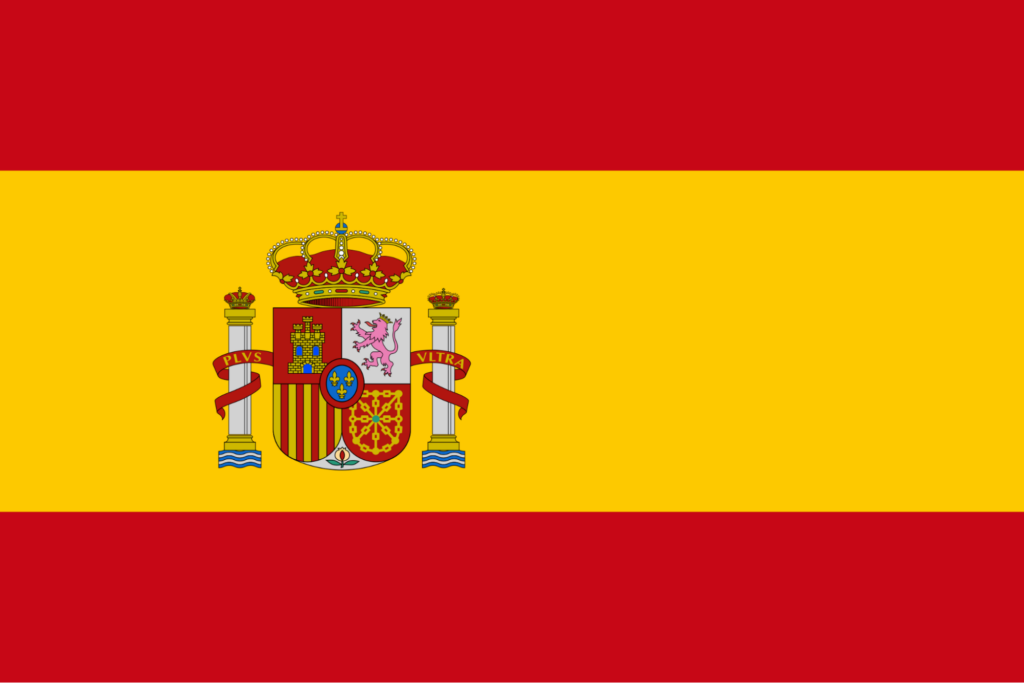
Is Psilocybin Legal in Spain?
Psilocybin is illegal in Spain, but its possession and use for personal consumption are not criminal.
This is because Spain has a policy of decriminalization of certain drugs, including psilocybin. Residents may face a small fine, but law enforcement does not criminally prosecute people for possessing and using drugs for personal consumption. Still, municipalities can pursue their own policies.
Is MDMA Legal in Spain?
MDMA is illegal for recreational use in Spain. Its possession, sale, and use outside of approved medical or clinical research contexts are prohibited, with minor consequences for violations of drug laws.
Is LSD Legal in Spain?
LSD is illegal in Spain, and its possession, distribution, and recreational use are prohibited. Spanish law strictly regulates the use of hallucinogenic substances like LSD. However, it does not criminally prosecute people for personal possession.
Is Ketamine Legal in Spain?
Ketamine is used for medical and veterinary purposes in Spain. Its recreational use is illegal, and it is subject to minor penalties for personal use.
Is Ayahuasca Legal in Spain?
In Spain, ayahuasca is not specifically prohibited, but it is also not permitted. The country has recorded the highest number of legal incidents related to ayahuasca in recent years.
Legal Psychedelics in Australia

Is Psilocybin Legal in Australia?
Australia recently rescheduled psilocybin and MDMA, making them available for therapeutic use by authorized psychiatrists. These psychedelics will be placed in Schedule 8, allowing prescriptions for specific mental health conditions like PTSD and treatment-resistant depression. However, psilocybin remains in Schedule 9 for unauthorized personal use.
Is MDMA Legal in Australia?
MDMA is legal in Australia for medical use as of the 2023 Therapeutic Goods Administration (TGA) Act. This law approved MDMA-assisted therapy for post-traumatic stress disorder (PTSD).
MDMA will be listed as Schedule 8 controlled drugs for these specific therapeutic uses while remaining Schedule 9 prohibited substances for all other purposes, primarily limited to clinical trials.
Is LSD Legal in Australia?
LSD is illegal in Australia. Its possession, distribution, and recreational use are strictly prohibited, and offenders may face legal consequences.
Is Ketamine Legal in Australia?
Ketamine is legal for medical and veterinary use in Australia, as it belongs to the Schedule 8 list of banned substances. Its recreational use is illegal and regulated as a controlled substance.
Is Ayahuasca Legal in Australia?
Ayahuasca is not explicitly banned in Australia, and prosecution for personal possession is rare.
Legal Psychedelics in Mexico

Is Psilocybin Legal in Mexico?
Mexican authorities do not consider small quantities of psilocybin to be a criminal offense. However, the specific quantity limits for personal possession may vary based on locality.
Notably, Mexican law allows psilocybin mushroom use in spiritual ceremonies, following Indigenous traditions that have been practiced for thousands of years.
Federally, the government recently introduced a bill aimed at legalizing psychedelics, including psilocybin, for mental health treatments.
Is MDMA Legal in Mexico?
MDMA is illegal in Mexico, and possession can result in minor penalties. However, possessing small quantities of MDMA is not subject to criminal prosecution. The law defines small quantities as up to 40mg of powdered MDMA or a single MDMA capsule or tablet weighing no more than 200 mg.
Is LSD Legal in Mexico?
Similarly, in Mexico, possessing small quantities of LSD, an illicit hallucinogen, is not punishable as a criminal offense. The law specifies that small quantities of up to 0.015 mg of LSD are considered for “immediate and personal consumption” and are exempt from criminal prosecution.
Is Ketamine Legal in Mexico?
Ketamine is not explicitly regulated in Mexico, and its legal status may lack clear guidelines. While it is used for medical and veterinary purposes, its recreational use may be subject to legal restrictions.
Is Ayahuasca Legal in Mexico?
Ayahuasca is neither specifically prohibited nor permitted under Mexican law. This legal ambiguity has led to situations where individuals have faced legal incidents for receiving ayahuasca by mail or carrying it on a plane. However, the country is somewhat tolerant of traditional and spiritual usage.
Legal Psychedelics in Jamaica
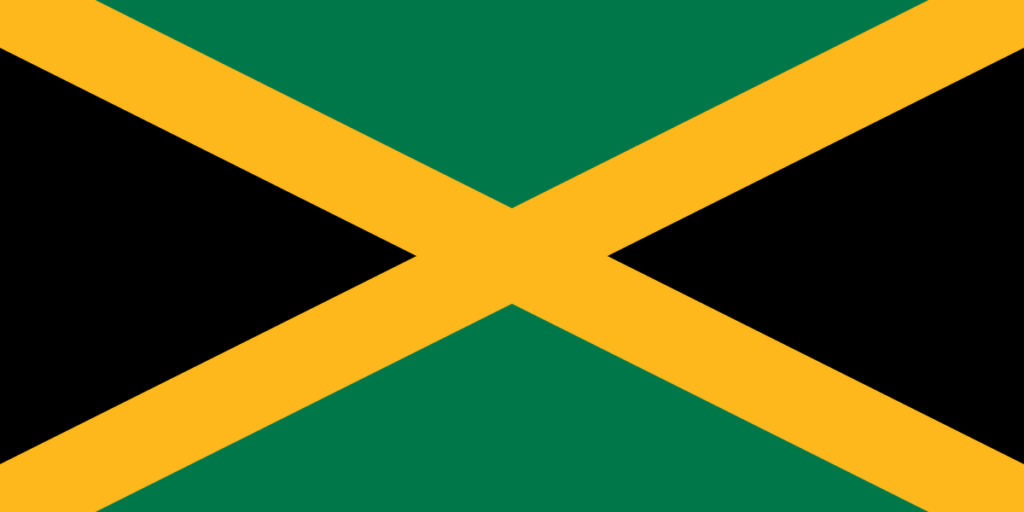
Is Psilocybin Legal in Jamaica?
Psilocybin possession, use, sale, and cultivation are legal in Jamaica. And working with magic mushrooms in Jamaica is legal. In fact, mushrooms containing psilocybin have never been prohibited or a controlled substance in this country.
As if it could get better, Jamaica’s government actively encourages the development of the psilocybin industry. And as a response, this Rastafarian nation is becoming a hub for those seeking psilocybin retreats.
Is MDMA Legal in Jamaica?
MDMA is illegal in Jamaica, and its possession, sale, and recreational use are prohibited. Jamaica has stringent drug laws, and violations can lead to legal consequences.
Is LSD Legal in Jamaica?
LSD is illegal in Jamaica, and its possession, distribution, and recreational use are strictly prohibited. Jamaica is known for plant-based hallucinogens, but LSD is not part of these traditions.
Is Ketamine Legal in Jamaica?
While sources say Ketamine in Jamaica can be used for medical and veterinary purposes, we weren’t able to locate sources to claim this. So, the jury is still out on ketamine legality, and we’d advise a conservative approach should you come into contact with this substance in Jamaica.
Ketamine is used for medical and veterinary purposes in Jamaica, but its recreational use is subject to legal restrictions.
Is Ayahuasca Legal in Jamaica?
Similar to ketamine, we weren’t able to locate any clear sources on the legal status of Ayahuasca in Jamaica. That said, the country was a part of the Convention on Psychotropic Substances in 1971, which marked DMT, the active ingredient in Ayahuasca as a controlled substance.
Legal Psychedelics in Austria

Is Psilocybin Legal in Austria?
Psilocybin is not explicitly regulated in Austria, and since 2016, it has been under the status of decriminalization. Its use is not common but is not strictly prohibited and if one does get caught with magic mushrooms, the punishment is free, mandatory therapy.
Is MDMA Legal in Austria?
MDMA is illegal in Austria. Decriminalization only applies to magic mushrooms. Although drug use is not a crime here and possession for personal use of drugs has been decriminalized. While possession isn’t a crime, selling and distributing psychedelics remains illegal.
Is LSD Legal in Austria?
LSD is illegal in Austria. Similar to LSD, decriminalization doesn’t apply here. However, synthetic psychedelics have largely been deprioritized by authorities. This means the laws around these substances aren’t seen as worth enforcing unless there’s a just reason to do so.
Is Ketamine Legal in Austria?
Ketamine is legal for medical and veterinary use in Austria. However, its recreational use is illegal, and it is regulated as a controlled substance, as this member of the arylcyclohexylamine class of substances is only considered legal in the presence of a trained practitioner.
Is Ayahuasca Legal in Austria?
Ayahuasca is illegal in Austria, with no retreat centers offering this medicine. The same holds with 5-MeO-DMT.
Legal Psychedelics in Croatia

Is Psilocybin Legal in Croatia?
In Croatia, the possession of psychedelics and other illicit drugs remains illegal. However, the Croatian Parliament passed a bill in 2012 that decriminalized the possession of small quantities of these drugs.
Prison terms are still enforced for those involved in manufacturing illicit drugs. However, residents found possessing small amounts will not face criminal charges. Instead, they’re subject to mandatory rehabilitation, community service, or a fine of €2,680.
Is MDMA Legal in Croatia?
MDMA is illegal in Croatia, and its possession, sale, and recreational use are prohibited. However, minor possession is not a criminal penalty.
Is LSD Legal in Croatia?
LSD is illegal in Croatia, and its possession, distribution, and recreational use are prohibited. Offenders caught with small amounts will face minor consequences.
Is Ketamine Legal in Croatia?
Ketamine is not explicitly regulated in Croatia, and its legal status may lack clear guidelines. While it is used for medical and veterinary purposes, its recreational use may be subject to legal restrictions.
Is Ayahuasca Legal in Croatia?
Ayahuasca is banned in Croatia but likely falls under the country’s decriminalization laws.
Legal Psychedelics in the Czech Republic

Is Psilocybin Legal in the Czech Republic?
Psilocybin is illegal for recreational use in the Czech Republic. However, the country has decriminalized the possession and use of small quantities of psychedelic compounds, treating them as misdemeanors rather than criminally prosecuting offenders. For psilocybin mushrooms, the definition of “small amount” is less than forty.
The Czech Republic is also considering decriminalizing psychedelics for harm reduction-based interventions, including drug consumption rooms, drug checking, and psychedelic sitting. These legislative proposals aim to reduce health and social risks while maintaining compliance with international drug control agreements, representing a significant step in shifting drug policy toward decriminalization
Is MDMA Legal in the Czech Republic?
MDMA is illegal in the Czech Republic, and its possession, sale, and recreational use are prohibited. However, possession of fewer than one gram of MDMA is only punishable by a fine. More than this is considered an offense, and the penalty ranges from two to eight years of prison.
Is LSD Legal in the Czech Republic?
LSD is illegal in the Czech Republic, and its possession, distribution, and recreational use are prohibited. The country’s laws strictly regulate the use of hallucinogenic substances like LSD.
Users are allowed to carry up to five tabs of acid without running into serious problems with the law. Beyond this amount, cops are permitted to arrest and charge offenders.
Is Ketamine Legal in the Czech Republic?
Ketamine is mainly used as an anesthetic l and for veterinary purposes in the Czech Republic. Additionally, ketamine is legally used in clinical practice for depression.
Recreational use is subject to legal restrictions, but minor quantities don’t warrant criminal penalties.
Is Ayahuasca Legal in the Czech Republic?
In the Czech Republic, DMT is decriminalized and treated as a misdemeanor. Possession of plants containing DMT is legal, but possessing more than 0.6 grams of synthetic DMT or more than half a liter of an ayahuasca brew with DMT is illegal, as determined by a 2014 opinion of the Czech Supreme Court.
Legal Psychedelics in Italy

Is Psilocybin Legal in Italy?
In Italy, drug use itself is not considered a criminal offense.
However, possession for personal use of drugs, including psilocybin, is subject to administrative sanction, including suspending a driving license and jail time.
Since 2014, Italy has distinguished between less dangerous drugs in Schedules II and IV and more dangerous drugs in Schedules I and III. Sanctions for personal possession offenses vary, with one to three months imprisonment for less dangerous drugs and 2-12 months imprisonment for more dangerous drugs.
First-time offenders typically receive a warning and may be referred for treatment.
In 2021, activists proposed a ballot measure to decriminalize personal cultivation of specific psychoactive plants and mushrooms, but a court ruling prevented it from being voted on in 2022.
Is MDMA Legal in Italy?
MDMA is illegal in Italy, and its possession, sale, and recreational use are prohibited. Italian drug laws are strict, and violations can lead to legal consequences.
Is LSD Legal in Italy?
LSD is illegal in Italy, and its possession, distribution, and recreational use are prohibited.
Is Ketamine Legal in Italy?
Ketamine is only legal for medical use in Italy.
Is Ayahuasca Legal in Italy?
Ayahuasca is illegal in Italy.
Legal Psychedelics in Switzerland

Is Psilocybin Legal in Switzerland?
Psilocybin is illegal but decriminalized in Switzerland under Article 19b in the Federal Act on Narcotics and Psychotropic Substances.
Is MDMA Legal in Switzerland?
MDMA is illegal in Switzerland. However, consuming a “negligible quantity” of controlled substances like MDMA is decriminalized under the Federal Act on Narcotics and Psychotropic Substances.
Is LSD Legal in Switzerland?
LSD is illegal in Switzerland, and its possession, distribution, and recreational use are prohibited. Minor possession, however, is decriminalized.
Is Ketamine Legal in Switzerland?
Ketamine is legal for medical and veterinary use in Switzerland.
Recreational use is illegal but likely also decriminalized for negligible quantities.
Is Ayahuasca Legal in Switzerland?
The Swiss Narcotic Act doesn’t mention ayahuasca, making its status unclear. However, members of the União do Vegetal Church and other religious organizations have legal permission to consume the brew.

How to Find Countries with Legal Psychedelics
Explorers of psychedelics must understand local laws, which can change frequently, before embarking on a psychedelic journey.
Government websites and international drug policy databases, such as the United Nations Office on Drugs and Crime (UNODC) or the European Monitoring Centre for Drugs and Drug Addiction (EMCDDA), can provide valuable insights on country-wide and regional rules.
People seeking a guided and legal psychedelic experience should visit the Third Wave Directory. This platform offers a carefully curated list of vetted psychedelic retreats and providers, connecting people with professionals who operate within the bounds of the law.
Third Wave’s Psychedelic Directory offers a user-friendly interface that allows explorers to filter options based on geographic location and desired substance.
Where Are Psychedelics Legal? The Bottom Line
The legal psychedelic landscape is as varied as the experiences themselves. Navigating the intricate web requires a careful and informed approach, recognizing that what may be legal in one place can be a severe offense in another.
As the psychedelic renaissance unfolds, explorers must stay informed, respect local regulations, and utilize resources like the Third Wave Directory to access responsible providers.
May the use of psychedelics be enlightening, transformative, and, above all, conducted with the utmost care.



